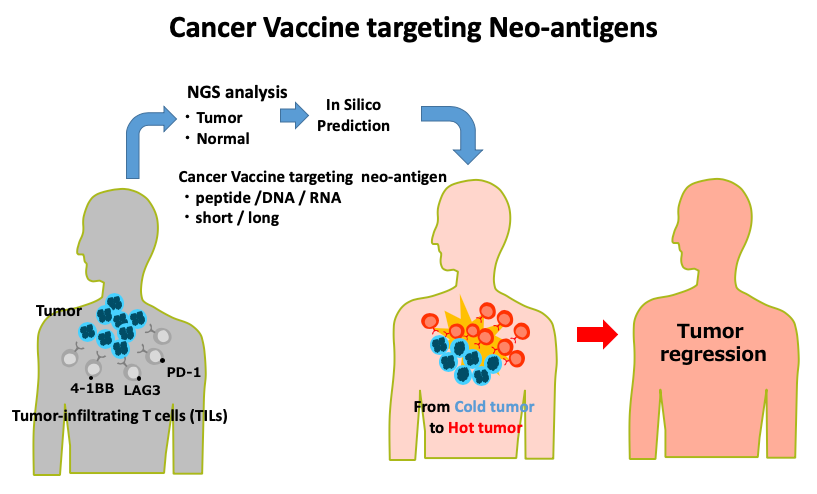Cancer vaccine
What is needed to improve the efficacy of cancer vaccine?
The clinical success of immunotherapy with checkpoint blockade antibodies has clearly shown that enhanced immune responses against cancer cells could lead to tumor regression. Among immunotherapies, cancer vaccine therapy is aiming to achieve therapeutic effect by inducing immune response to the administered antigen expressed by tumor cells. To date, a variety form of cancer vaccine trials using short peptide, long peptide, protein, DNA, and mRNA etc. have been conducted around the world, however, the results of clinical trials have been far from satisfactory so far. Therefore, combined immunotherapy with cancer vaccine therapies and other immunotherapies such as checkpoint blockade antibodies are being actively tested to achieve better therapeutic effects. Although cancer testis antigen and differentiation antigen etc. have been usually used as target antigens for cancer vaccine, mutated antigens (neo-antigen) derived from genome mutations in individual tumor have been attracting much attention as promising target antigens.
What we do
In general, we analyze immune response by using peripheral blood samples, but the problem in this case is that frequency of the induced antigen-specific T cells is relatively low. For this reason, it is usually required to perform a procedure involving antigen stimulation for a certain period and to dramatically amplify the frequency of antigen-specific T cells. To overcome this problem, we have established more sensitive immune response detection method than conventional methods, which can minimize incubation time, based on the sensitivity of CXCR3 ligand CXCL9,10. Through analysis using human and mouse immune systems, these chemokines have been confirmed to be produced in large amounts even in the presence of minute amounts of IFN-g, and more importantly, rapid production of these chemokines have been observed immediately after specific immune responses occurred. Currently, using this detection method, we are conducting an immune response analysis of cancer vaccine therapy, and we are also working on the development of various forms of personalized cancer vaccine therapy targeting neo-antigens encoded by an individual’s tumor.




 TOP
TOP